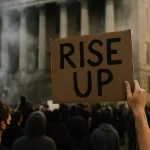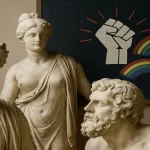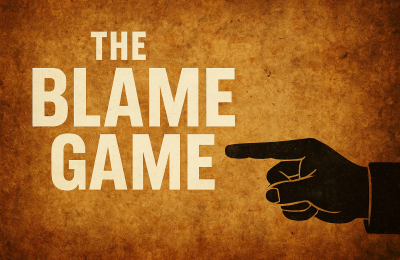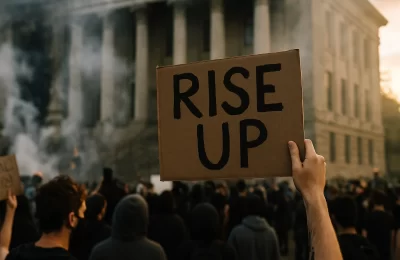Part 2 of the Series: Critical Theory, the End Times, and the Christian Response
Introduction: The Chess Game with No Rules
Imagine sitting down to play chess. You carefully plan your moves, anticipate strategies, and protect your king.
But midway through the match, your opponent sweeps the pieces aside and declares:
“This is oppressive. From now on, knights can move like queens, pawns can move backward, and victory is a social construct anyway!”
The rules have not merely been changed; the very idea of rules has been dismantled.
This is what Critical Theory does to truth: it moves beyond challenging specific truths to challenging the very concept of truth itself.
About This Series
This article is the second installment in our series Critical Theory, the End Times, and the Christian Response.
In Part 1, we explored the rise of Critical Theory as a false gospel. Now we move deeper—examining how Critical Theory redefines reality itself to make deception seem compassionate and rebellion appear righteous.
To view all parts of the series, please visit the Series Page
The Assault on Truth: How Critical Theory Reframes Reality
In the biblical worldview, truth is objective, universal, and grounded in the character of God:
- “Sanctify them by the truth; Your word is truth.” (John 17:17, LSB)
- “God is not a man, that He should lie…” (Numbers 23:19, LSB)
Truth is not invented; it is revealed.
But Critical Theory teaches:
- Truth is socially constructed, created by power structures to oppress marginalized groups.
- Experience, not evidence, determines truth (“lived experience” becomes the highest authority).
- Language shapes reality, so deconstructing language deconstructs power.
- All claims to universal truth are seen as disguised attempts to dominate.
Thus, Critical Theory systematically erodes the concept of objective truth, replacing it with competing narratives of oppression and liberation.
Key Terms and Their Redefinition
| Critical Theory Term | Biblical Response |
|---|---|
| Lived Experience | Personal experience is valuable but must be tested by objective truth (Proverbs 18:17; Acts 17:11). |
| Narrative | Human stories exist, but God’s metanarrative (Creation, Fall, Redemption, Restoration) is ultimate (Genesis–Revelation). |
| Deconstruction | Deconstruction of language and norms is rebellion against the order God created (Genesis 3; Romans 1:25). |
| Truth as Power | Truth reflects God’s unchanging nature (Malachi 3:6); it is not a human invention. |
The Real Danger: When Truth Becomes Optional
Paul prophesied this in 2 Timothy 4:3–4:
“For the time will come when they will not endure sound doctrine, but wanting to have their ears tickled, they will accumulate for themselves teachers in accordance with their own desires, and will turn away their ear from the truth and will turn aside to myths.”(LSB)
Critical Theory fits this pattern exactly:
- Myths of oppression and liberation replace biblical categories of sin and salvation.
- Subjective emotions replace objective moral law.
- Power narratives replace God’s revealed Word.
Critical Theory’s Three-Stage Attack on Truth
- Doubt Objective Truth“Your truth” vs. “my truth.”
- Dismantle Universal CategoriesMale and female? Oppressor and oppressed? Only fluid, shifting constructs.
- Rebuild Reality Around Identity PoliticsPower belongs to those whose “lived experience” of oppression is most validated.
This is not merely intellectual drift.
It is spiritual rebellion, echoing the Serpent’s first lie:
“Has God really said…?” (Genesis 3:1, LSB)
Story: The Emperor’s New Pronouns
A king once paraded through his kingdom wearing no clothes, convinced by flatterers that he was adorned in glorious robes.
Everyone played along, terrified to question the obvious.
Today, society demands we affirm the emperor’s new pronouns, new identities, and new truths — lest we be labeled intolerant heretics.
Yet truth stubbornly persists, like the child who finally cried, “But he isn’t wearing anything at all!”
Biblical Christians must be that child: seeing clearly and speaking honestly, even when the culture demands delusion.
Where Deconstruction Leads: The End-Times Connection
When truth collapses, lawlessness follows.
Jesus warned:
“And because lawlessness is multiplied, most people’s love will grow cold.” (Matthew 24:12, LSB)
Paul declared:
“For the mystery of lawlessness is already at work…” (2 Thessalonians 2:7, LSB)
Critical Theory’s dismantling of truth paves the way for:
- Global confusion
- Moral anarchy
- False unity under a coming Antichrist figure who redefines right and wrong by sheer will (Daniel 7:25; Revelation 13:5–7).
In abandoning truth, the world does not find freedom — it finds slavery.
Practical Application: Walking as Children of Light
- Anchor Your Mind in Scripture: Renew your mind daily in God’s Word (Romans 12:2).
- Test All Claims: Be like the Bereans (Acts 17:11) — test ideologies, slogans, and narratives against biblical truth.
- Speak the Truth in Love: (Ephesians 4:15) — not harshly, but with clarity, compassion, and courage.
- Prepare for Cultural Pressure: Expect to be misunderstood. But remember: “The light shines in the darkness, and the darkness did not overtake it.” (John 1:5, LSB)
Reflection Questions
- Where do you see Critical Theory’s denial of objective truth most vividly today?
- How does replacing objective truth with “lived experience” undermine justice and human dignity?
- In what areas of your life do you need greater courage to speak the truth in love?
References
Horkheimer, M. (1982). Critical theory: Selected essays (M. J. O’Connell, Trans.). Continuum. (Original work published 1972)
Lindsay, J., & Pluckrose, H. (2020). Cynical theories: How activist scholarship made everything about race, gender, and identity—and why this harms everybody. Pitchstone Publishing.
Trueman, C. (2020). The rise and triumph of the modern self: Cultural amnesia, expressive individualism, and the road to sexual revolution. Crossway.
The Holy Bible. (2021). Legacy Standard Bible. Three Sixteen Publishing. https://read.lsbible.org/
Footnotes
[^1]: The term “lived experience” in Critical Theory refers to personal narratives as authoritative truth. However, Scripture commands testing personal experiences against divine revelation (1 Thessalonians 5:21; Acts 17:11). Experience alone is not sufficient to define reality.
Glossary: Key Terms for Understanding Critical Theory and the End Times








